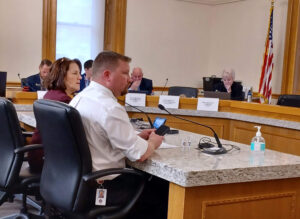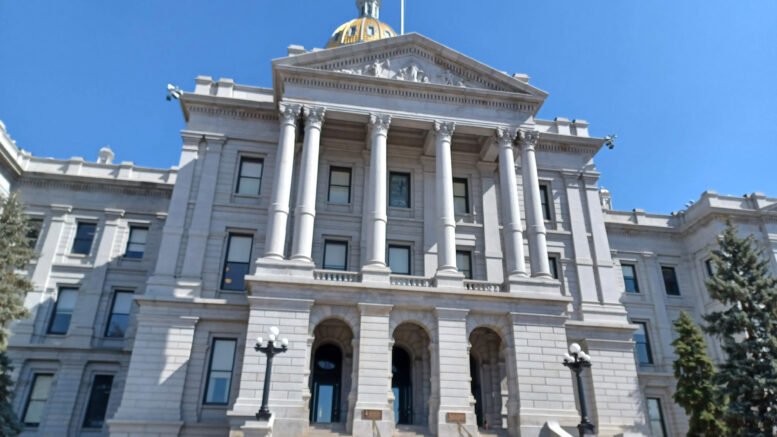A key member of Gov. Jared Polis’ cabinet sent a letter to Colorado legislators Wednesday expressing his “extreme opposition” to their use of unemployment taxes to fund enforcement of proposed new labor laws, and he hinted that any bills trying to do so could face a veto.
Joe Barela, executive director of the Colorado Department of Labor and Enforcement, penned the letter because several bills that are attempting to boost regulation of employers are seeking to take money from the Employment Support Fund for that purpose. And, Barela added, three laws passed in 2022 are looking to dip into the same source of money, which he considers a dangerous idea while CDLE continues to borrow from the federal government to prop up its insolvent Unemployment Insurance Trust Fund.
The ESF is a 33-year-old fund that is seeded by the first .00145% of the unemployment-tax payments submitted by employers to the UITF, which pays unemployment benefits to workers who lost jobs without cause and went broke in 2020 under a crush of pandemic-related layoffs. The ESF traditionally has helped to fund the administration of the UITF and has issued grants to local workforce-development centers in order to help more Coloradans become employed, though a 2001 law allows it to fund enforcement of labor standards and labor relations too.
While just five laws passed from 2016-22 took money from the fund, six bills this year have sought to pay for enforcement of proposed new labor laws or to pay new benefits from the ESF. The proposed growth of uses for the money has expanded to funding ongoing programs passed last year, including laws cracking down on wage theft, regulating supplemental healthcare staffing agencies and permitting collective bargaining by some county-government workers.
Details of the letter
Barela, who told The Sum & Substance earlier this month that he was worried about the proposed diversion of money, intensified his reaction in the letter addressed to members of the General Assembly. He explained that the ESF is currently the only state source for workforce-development funding during a time of workforce shortages, and he noted the proposed use of nearly $3 million from it for labor-law enforcement comes as CDLE is working with the U.S. Department of Labor to bring the structure of the fund into conformity with federal law.
“With the increased interest in the ESF as a funding mechanism, I wanted to provide you with information about the purpose of the ESF and express the department’s extreme opposition to the use of the fund,” Barela wrote.
Later in the letter, he added what could be viewed as a threat that the administration could seek to veto any bills using ESF funds for these purposes.
“The Department of Labor will oppose any piece of legislation that uses the ESF as a funding mechanism, and request the governor prevent additional drains on ESF through his final action on any legislation that uses the ESF.”
Efforts to use the fund
Barela identified four bills moving through the legislative process whose fiscal notes identify the ESF as a source for funding for their enforcement:
• Senate Bill 17, which would add natural disasters, closures of children’s schools and the deaths of family members as reasons that Colorado workers can use earned paid sick leave;
• SB 98, which would increase the amount of information that gig-worker companies like Uber and Lyft must provide to drivers regarding their payments;
• SB 105, which increases the transparency requirements of employers in advertising jobs and promotions and in the hiring process for those jobs; and,
• SB 111, which would grant public-sector workers the right to engage in organizing activities and participate in the political process in off hours.
Barela’s letter does not address House Bill 1118, the Fair Workweek act that would have required restaurateurs and retailers to give schedules to employees at least two weeks in advance and made them pay extra wages if adding or reducing hours in that time frame. That bill died in a House committee on a bipartisan vote early this month.
It also doesn’t address HB 1078, the sixth bill that seeks to use ESF funding. However, that bill, sponsored by Democratic Sen. Chris Hansen of Denver, is not a labor-law-enforcement bill but a measure that seeks to add benefits directly from the UITF to dependents of out-of-work Coloradans and is, as such, a more natural fit for using funds generated by unemployment taxes.
Legislative concern

Colorado state Rep. Shannon Bird (left) answers questions with Rep. Ron Weinberg last month about their proposed House Bill 1189 on home buying tax credits.
Rep. Shannon Bird, the Westminster Democrat who raised concerns about the use of ESF funds in a Joint Budget Committee hearing two weeks ago, reiterated those worries Wednesday after receiving Barela’s letter. She said that she was glad to see him weigh in on the matter and take an expansive view of the appropriate use of ESF funds.
“As I indicated earlier, I am very concerned that use of this fund beyond its originally intended purpose has great potential to destabilize the fund and jeopardize support for the worthy programs it is intended to support,” Bird said Wednesday.
